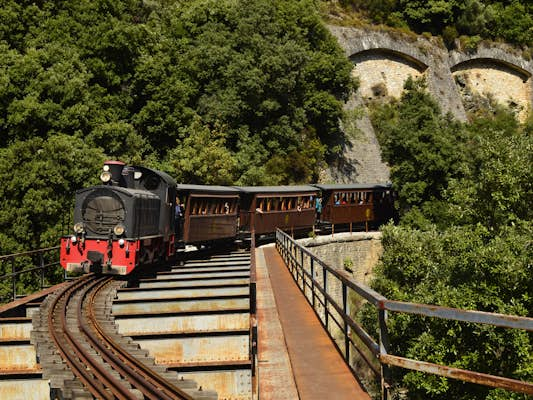When it comes to train travel, Greece rarely springs to mind. The country’s relatively limited rail network means it doesn’t appear on any ‘epic train journeys’ lists, and because of this a number of its amazing – if short – stretches of railway remain unknown to the wider train-loving community of travellers.
With only a few international connections and just one main line running from Athens to Greece’s northern border, the Greek Railways have suffered underinvestment and neglect for decades. However, things have been changing recently, as the country comes to recognise the train as an environmentally friendly, efficient and exciting means of travel. The electrification of the main line, the construction of double track all along and the upgrade of the rolling stock have made journeys faster as well as more reliable and comfortable. For the true train aficionado, however, there are still a few short routes off the country’s main network where speed and efficiency remain less important than the sheer pleasure of the journey.

The Pelion line
The Pelion trenaki (little train) was constructed by Giorgio de Chirico’s father, who was an important engineer at the turn of the 19th-century. It connected Volos (where the artist was born in 1888) with Milies, a picturesque village on Pelion mountain, which was the mythical habitat of the kentavri (centaurs).
The train was brought back to life as a tourist attraction in the 1990s, though the steam engine that pulled the four carriages uphill was replaced by a diesel engine in 2010. These days the service only operates on the 15km section between Ano Lehonia and Milies, but the magic of the journey remains intact. The 60cm-gauge line is one of the narrowest in the world and the train’s speed of just 20km/h allows for a leisurely and absorbing expedition in the heart of one of Greece’s most beautiful mountains. Unspoiled nature with thick plane, oak and pine forests, stone and steel bridges from another era and stunning views of the Pagasitikos Gulf make the 90-minute journey an absolute delight for train and nature lovers.
The train runs every Saturday and Sunday year-round and daily during August (departing Ano Lehonia at 10am, returning from Milies at 3pm); there are extra services during public holidays and busy periods. Return tickets cost 18/12 euros for adults/children.

Diakofto–Kalavryta
A technological marvel at the time of its inauguration in 1896, the rack railway – or Odontotos, as it’s widely known – connects the small seaside town of Diakofto in the northern Peloponnese, with Kalavryta, a mountain village with rich history that is one of the most popular ski resorts in Greece.
The small modern train climbs from sea level to a height of 750m through Vouraikos Gorge. The ascent is so steep at some points that it must be assisted by the rack and pinions of the engine and the track, one of the few railways in the world to feature this system. The 22km journey through stunning nature, leafy forests, waterfalls and tunnels takes an hour and 10 minutes. Drop-off stops are possible on demand at a few spots along the route. Weather permitting, many passengers opt to walk down to Diakofto along the track – an invigorating hike that takes four to five hours.
The service runs three times daily during weekdays and five times on weekends and public holidays. Return tickets cost 19/9.60 euros for adults/children.

Olympia–Pyrgos–Katakolo
Sadly, apart from Odontotos, the only remaining operational section of the stunning Peloponnesian rail network is the line connecting the charming little port of Katakolo in the western Peloponnese with Ancient Olympia via Pyrgos town. Dating back to 1882, the line was the first to be built outside of Athens, intended to boost the commercial activity and exports of local products (mainly raisins).
These days, it’s arguably the prettiest route to one of Greece’s most important archaeological sites and the birthplace of the Olympic Games. Sacred ruins scattered under prolific greenery and an atmosphere steeped in history and myth make for a not-to-be-missed, inspiring expedition. Thankfully, tourism has given the line new life and popularity, and after decades of neglect the local authorities and the Greek Railways now have plans to improve the track and upgrade the services.
There’s one return trip between Katakolo and Olympia every morning and three between Pyrgos and Olympia, except for Sundays and public holidays. However, there are extra services when cruise ships moor at Katakolo for the passengers who wish to visit the ancient site for the day. Return tickets for the entire 45-minute journey cost 10 euros.

Stavroupoli–Toxotes
Unlike all of the previous routes, this short but absolutely gorgeous stretch of railway is part of the country’s main network on the line connecting Thessaloniki with Alexandroupoli, but also a worthwhile destination in its own right.
Between the villages of Stavroupoli and Toxotes the rails part with the motorway and follow their own majestic route through the mountains and the straits of the Nestos river. The whole area is a national park protected by international environmental conventions and a valuable wetland ecosystem, home to eagles, waterfowl, otters, wild horses and other rare fauna. Unfortunately, the crossing of the straits along the meandering stream and through old stone tunnels takes only a few breathless minutes, but the drivers of local trains are happy to stop on demand and drop you off at the lovely little station of the abandoned Livera village, right in the heart of the green valley.
Accommodation, trekking, horse riding and kayaking can be arranged at the village of Toxotes, and the delightful old town of Xanthi with its atmospheric alleys and Ottoman feel is only a few minutes away on the same train.
